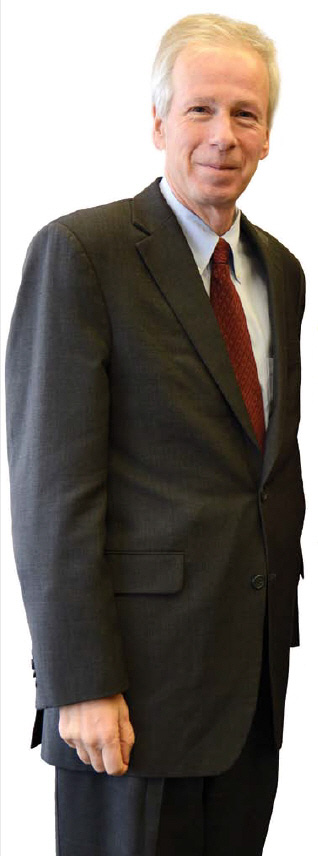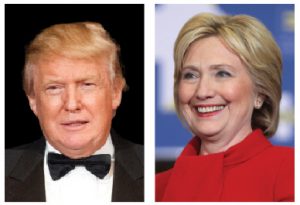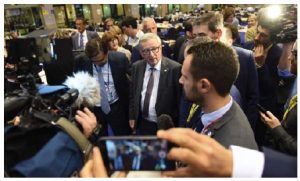 Stéphane Dion is an academic-turned-parliamentarian who was first elected to represent the Montreal riding of Saint-Laurent in 1996. He has served as president of the privy council, minister of intergovernmental affairs and minister of the environment and became leader of the Liberal party for two years, beginning in 2006 after then-prime minister Paul Martin’s electoral defeat and resignation. He stayed on as leader in opposition. During that time, he challenged then-prime minister Stephen Harper’s leadership and attempted, unsuccessfully, to bring down his minority government. He has been Prime Minister Justin Trudeau’s foreign minister since November 2015. He spoke with Diplomat’s editor, Jennifer Campbell.
Stéphane Dion is an academic-turned-parliamentarian who was first elected to represent the Montreal riding of Saint-Laurent in 1996. He has served as president of the privy council, minister of intergovernmental affairs and minister of the environment and became leader of the Liberal party for two years, beginning in 2006 after then-prime minister Paul Martin’s electoral defeat and resignation. He stayed on as leader in opposition. During that time, he challenged then-prime minister Stephen Harper’s leadership and attempted, unsuccessfully, to bring down his minority government. He has been Prime Minister Justin Trudeau’s foreign minister since November 2015. He spoke with Diplomat’s editor, Jennifer Campbell.
Diplomat magazine: You’ve been foreign minister for nine months now. If you look around the world today, what are the top five places of most concern for the Canadian government?
Stéphane Dion: That’s a very tough question right off the bat. The world is not in good shape. When you look around the world, it’s hard to imagine a better place to be than Canada. I would have difficulty pinpointing just five places. Europe has its problems; the U.S. has a strange election; Brazil, as we’ve seen, has youth problems; Africa has many challenges and, in Asia, there are a lot of tensions, including in the South China Sea. It’s hard to imagine a place in the world right now that doesn’t have problems.
DM: How do you see Canada’s involvement in Syria developing in the short and long term?
SD: I see more progress in Iraq. In Syria, we don’t see [Bashar al-Assad] as part of the solution for the long haul, so it’s more difficult in Syria than Iraq. As you know, we’ve been invited to be at the table [to discuss] Syria and I am focusing on the necessity to help the civilians during these never-ending conflicts, to make sure they’re fed and have medication. The focus is more on the short term and to try to encourage Iran to be at the table on negotiations. [We also need a new] constitution for Syria, a process by which a new government could be chosen, a government that would have true legitimacy for the whole country. And in the meantime, we need to get rid of DAESH or ISIL, in Iraq and Syria and we are making progress on this point.
I’m very confident about the situation in the north of Iraq. Canada has been instrumental in providing strong training to be [certain] the Mosul fighters will be effective and that Mosul will be freed.
DM: Do you see Canada’s Operation IMPACT in Iraq as peacekeeping?
SD: It’s not classic peacekeeping since we are in conflict with a terrorist group that has been able to have an army of its own and to conquer cities and villages. We are freeing these towns, one by one. But [we are doing this in] training the local fighters because we [decided we would not] fight directly in this country. [The fighting] must be done by the Iraqi people themselves, but we are part of a coalition. We have decided that Canada will provide training, advice, intelligence services and transportation. We are very effective and we should be proud of our men, women [in uniform] and [our] civilians who are working there for Canada.
DM: The government of Stephen Harper was an unabashed supporter of Israel, which many said caused Canada to lose its United Nations Security Council seat, because of backlash from the Middle East. How do you strike a balance on Israel?
SD: For me, it’s not a matter of balance. We strongly support Israel, but to support Israel is to look for peace for everyone. The status quo is not sustainable, neither for Palestinians, nor for Israelis. We need to find all the possibilities to convince both parties to come back to negotiations and to find a solution. The difference between us and Mr. Harper is that Mr. Trudeau will never be reluctant to say that the status quo is not sustainable. It is not healthy for Israel or
Palestine.
DM: What role can Canada play there?
SD: I think it’s important to speak to all the legitimate forces there — to be an interlocutor for peace, a very effective peace-builder. That’s what we’re trying to do. [Canada participated in ministerial meetings on the Middle East peace process in Paris in June.] In the meantime, Canada must be there for humanitarian support, for education, and we need to look at the issue of water management. Canada has a lot of expertise to offer. Israel is very well known for their expertise as well. So there are partnerships that can develop — much more than we have today. There is a potential we need to exploit in a more effective way.

DM: Canada and the U.S. are the world’s largest trading partners. More than $670 billion US in goods and services were traded in 2015. Are you concerned about the U.S. election? Both candidates have said they’ll renegotiate NAFTA, and neither likes the Trans-Pacific Partnership.
SD: We have some trepidation about that, of course. Not only do we have a stake, but in many places in the world, there’s a sense that protectionism is more entrenched than it has been. We think it’s a mistake. Canada is a trading nation. We believe in trade. We are ready to explain that to the Americans. We think that it would cost a lot of jobs and economic activity if we were to weaken our economic dealings. We need to co-operate on security, but also for the economy. It’s the same for Europe. As you know, we’ve appointed my friend, Pierre
Pettigrew [an MP from 1996 to 2006, who held several ministerial positions, including foreign minister] as our special envoy to convince the Europeans to ratify [the Canada-EU trade agreement.] So we are strongly voting for open markets with the U.S., with Europe and we will work with the next U.S. administration to be sure that this will be the case.
DM: Even if it’s Donald Trump?
SD: We’ll work with the president that our American friends choose.
DM: You’ve talked about opening doors to countries such as Russia. You’ve stated that sanctions are important, but that dialogue is also important. Can you explain a little bit about your strategy when it comes to expansionist Russia?
SD: It’s not my strategy, it’s that of NATO and our allies. Everybody is doing that, except Canada in the past — but not anymore. All of the NATO members are collectively making sure we have strong deterrence against the behaviour of Russia that is unacceptable, but at the same time, [seeking] strong dialogue in order to avoid the escalation.
DM: What is this strong deterrence?
SD: At the Warsaw Summit, the Alliance took important decisions to boost security in and around Europe, including the deployment of an enhanced forward presence in Eastern Europe. Canada announced it will take on a leadership role and lead a robust multinational NATO battlegroup in Latvia, becoming one of four framework nations, as part of the Alliance’s enhanced forward presence. This is part of the modernization of NATO’s deterrence and defence posture. The ultimate goal of deterrence is to avoid conflict. By showing resolve, NATO Allies aim to dissuade potential adversaries from using military means instead of diplomacy. In order to protect NATO Allies and preserve European stability, NATO will stand united and ready to respond to threats from all directions.
When I became the minister of foreign affairs, all my counterparts were asking me to ‘please, come with us and speak to the Russians. If you don’t speak to the Russians, you’ll never be relevant. You won’t be able to help Ukraine, you won’t be invited to the table, including in Syria.’ It’s not because I agree with [Russian President Vladimir] Putin, or the prime minister agrees with him. It’s precisely because we disagree that we need to have strong dialogue. Canada will never recognize the illegal annexation of Crimea. Canada has been explicit in its condemnation of Russia’s past acts of aggression, but also on areas where we think dialogue can lead to improvements for us, for Ukraine and for global security. Deterrence and dialogue is our approach as one of the four framework nations, and it is our bilateral approach as well. It is important that allies remain united against Russian aggression towards Ukraine. When we are at the table, we can hold individuals to account, push for action and press for change. Engagement takes many forms and we are going to pursue every avenue in the cause of peace and stability.
DM: So that’s the long-term plan?
SD: Yes, and we’ll continue to go for sanctions. Canada is very strong on sanctions and we insist, with our European friends, that we keep them. They’re only effective if they’re collective. If we do it together with our NATO partners, then you have positive results. In March [2016], we added new individuals and companies to the sanctions list, in co-ordination with our allies.
DM: Canada’s been criticized for not being principled enough on China. How do you respond to that?
SD: I think what happened under Mr. Harper is that — as the prime minister said — it was a lack of consistency. One day they were open to everything with China and the day after they were closed to everything. Hot and cold — this is not effective. [Trudeau travelled to China in late summer to restart the Canada-China relationship and discuss the possibility of a free-trade agreement.]
In order to have a very coherent policy with China, you need to have consistency. So, of course, we’ll engage with China on trade, about education, people-to-people [exchanges], tourism, climate change, the environment, what we do together for peacekeeping in Africa, for example. They are there; we are there. We cannot ignore each other. It would not make sense. But at the same time, we will push for the rule of law. We will say to our Chinese friends, ‘If you want Canadian investors to feel comfortable in your country, give them the rule of law, otherwise, they will be concerned about their investments.’ I will tell them [that if they] want more exchanges with our universities, respect the freedom of [academics], otherwise it’s very difficult to have scientific exchanges. If you don’t engage with China, you will lose the opportunity to make progress on human rights there.

DM: Will Canada make a statement on the recently released organ-harvesting report on China by human rights activists David Kilgour and David Matas? [Matas is an immigration and human rights lawyer; David Kilgour is a former MP and federal minister. Their report alleges that Chinese hospitals are conducting far more organ transplants than the country admits. They suggest the government is getting organs from prisoners of conscience.]
SD: I am very pleased that we have different views in Canada, including those from my former colleague. We’ll look at that. It’s a point of view, but there are other points of view. Recently, there was a very interesting paper explaining polls in China, how they see their own country, what they see as [areas] for improvement. I’m very pleased that David [Kilgour] is making his point and we are looking at that with a lot of seriousness.
DM: So you’ll address it?
SD: We take seriously all of the efforts that are [seeking] a better understanding of China. We have a pluralistic view about China in Canada and it’s important to have different voices. We are taking all of these views into account. Canada continues to urge China to adhere to their human rights obligations. I have expressed, directly to China’s foreign minister, Canada’s interest in strengthening our relationship with China on a range of issues, including human rights.

DM: Going back to the late spring, what was your reaction to Brexit?
SD: We said before the polls that we thought it would be better to keep the EU together and we were very positive about the role the U.K. has played in the EU. The U.K. was divided, but we’ll watch how the EU and the U.K. negotiate. In the meantime, we are saying to the EU, if you want to show that you’re able to move ahead, well, ratify the trade agreement with Canada. If you don’t ratify with Canada, with whom will you ratify? It’s important to show the EU that they are able to move ahead after Brexit. The U.K. supports the agreement and is still part of the EU and when we know more about the agreements between the U.K. and the EU, it will be a chance to strengthen our links even more — because they’re already strong — with the U.K.
One thing that I think is very likely is that Canada will have a trade agreement with the EU before the U.K. leaves the EU.
DM: You have quoted Ban Ki-moon on the rise of xenophobia in Austria; it’s happening elsewhere in Europe, too. What can Canada do about it?
SD: Canada has a lot of responsibilities about that because Canadians elected a prime minister who said ‘If you vote for me, you will not have less refugees, you will have more;’ a prime minister who said to Canadians, ‘Our strength isn’t in spite of our diversity, but because of it.’ So we are the opposite of this kind of xenophobic populism that we see everywhere. And if he is the most popular politician on this planet, it’s not only because of his charisma, it’s mostly because of his message and that message says, ‘Don’t be afraid of the diversity of others, the diversity of humanity is an opportunity to go forward, to learn something, to improve yourself.’ This message of respect for our differences is something the prime minister is promoting around the world and for me, as minister of foreign affairs, it is very inspiring to [work] under the leadership of Justin Trudeau.
DM: So Canada is leading by example?
SD: It’s leading by example and it’s suggesting that maybe it will work in their own countries. Yesterday, I was with a politician from another country — I won’t name the country. He’s campaigning to be the leader of his country and I told him we’d noticed he was campaigning in favour of rule of law. I told him we did this and we won. I told him not to compromise. Why would it not be true in that country that diversity is a strength and not a threat? I see in the eyes of my [foreign] colleagues that they are inspired and that maybe they can invent their own Canada in some ways.
DM: You talk about Canada’s international role as being in places where there’s a requirement for engagement. Can you speak to that statement with a couple of actual examples of where that’s happening and how effective it is?
SD: We have a bid to be on the Security Council at the United Nations. In the past, Canada has been very [disengaged] at the United Nations and there is a request everywhere for us to be back. On peace operations, we have been almost nowhere for a long time. There is [a request] from many countries for us to come back and support them and offer our expertise. I spoke about the challenge of water. Water is a huge problem around the world, especially because of climate change, but not only because of that. There are countries in Africa that haven’t seen rain in years and they’re asking us to help them manage their water system.
DM: One of the early controversies you dealt with was the arms deal with Saudi Arabia. Has that been politically damaging?
SD: If you don’t have any controversy as minister of foreign affairs, you are not doing anything. I’m not concerned about that. We’ve made the right decision. It was a decision announced before the election and you need to keep your word. We had given our word to respect the contract, but at the same time, we’ve said that the export permits will be reviewed with a lot of vigour and more transparency and that’s what I’m doing. We have said we will be part of the arms trade treaty. In June, I announced that we’d table a bill to be sure that Canada will be part of the Arms Trade Treaty before next May. We have prioritized the necessary internal legislative reviews to expedite accession to the treaty. We’re also ensuring that the export control system is delivered with more rigour and transparency than has ever been the case in the past.
DM: What’s the best real-world example you can name that would clearly illustrate your desire for what you call responsible conviction?
SD: When you don’t like something, you don’t pull out, you work harder to make it better.
DM: OK, but where are we doing that?
SD: We are doing that everywhere. We are not happy with the United Nations all the time, it’s not a perfect institution to say the least, but we don’t get out because of that — we go there. We don’t like the government of Russia and we don’t like the way they behave with their neighbours, but we decided to have an intense dialogue with them instead of pulling out. We don’t like the government of Iran, but to be out of Iran is not the way to serve Canadian interests and to be helpful to our allies. So we will be back in Iran.
Canada’s severing of ties with Iran had no positive consequences for anyone: not for Canadians, not for the people of Iran, not for our allies and not for global security. Our strategy of engagement is a harder path than that chosen by the previous government, but if we want to make real progress in the promotion of human rights and the security of our friends and allies, it’s the only way forward. Engagement does not mean that we agree with Iran’s policies, but it does establish a pathway towards dialogue, regional security and economic opportunity. The lifting of sanctions is one step in the process of re-engagement and is in lock-step with the actions of our allies.
Responsible conviction means that along with your convictions, you have a sense of responsibility. If you have convictions without a sense of responsibility, you can’t have a rational and effective foreign policy. The consequences of your [actions] and declarations on other human beings must be positive — otherwise, don’t do it. So it’s a big departure from the former government of Canada and it’s well-timed. It’s not true that it means that you don’t then have convictions. It means that if you have to choose between different convictions, the [decision] will mean taking into account the consequences of your choices. We’ll be principled, we’ll have strong convictions and one of them is a sense of responsibility.
DM: I realize time is short, so let’s do a lightning round of key issues. I’m looking for short answers. Let’s start with Ukraine.
SD: Canada is strongly supporting Ukraine. Ukraine is the victim of aggressive behaviour from Russia. The Minsk Agreement [to halt the war in the Donbass region of Ukraine and signed by Ukraine, Russia, Donetsk and Lugansk], must make progress. If we don’t have progress on the implementation of Minsk, a year from now, we’ll have the same stalemate with more people killed in the meantime. It’s very important to see Minsk moving ahead.
DM: China’s territorial ambitions in the South China Sea?
SD: It’s time for everyone, including China, to accept and respect the code of conduct. To negotiate, and, in the meantime, when you don’t have solutions about the negotiations, you agree to disagree and agree to have acceptable behaviour with no aggressive initiatives. It’s very important for China and all parties involved to respect the code of conduct.
DM: The behaviour of China’s foreign minister, Wang Yi, in Canada?
SD: I had a private conversation with him after and I will not say more.
DM: Were you hard on him?
SD: I will not say more. I think it’s these kind of problems that will be solved outside the media, in order to avoid escalations that may be damaging for Canadian interests.
DM: Taiwan’s future?
SD: I think it’s something that must be solved between Taiwan and China, without any military threats. As long as the people of Taiwan won’t be part of China, I hope everybody will respect that.
Taiwan is not a country that we recognize, as you know. But, we think that the current situation must be respected and if there are ways to improve the relationship between China and Taiwan, it must be done peacefully.
DM: Canada does support Taiwan in a number of ways, unofficially.
SD: We trade with Taiwan. We have a lot of Canadians who are of Taiwanese origin, so there are people-to-people relationships and we’ll continue to have those. But there are no diplomatic relations with Taiwan as a state because it’s not a state. It’s up to China and Taiwan to solve this situation peacefully.
DM: Canada’s relationship with Iran?
SD: We are trying to create a relationship with Iran that will be more effective for Canadian interests. Lots of Canadians that are of Iranian origin have found it difficult — students, families, business. We are trying to improve the relationship and we are insisting on seeing if this government will be more respectful of human rights, stop having relationships with terrorist groups and stop being a threat for our allies, including Israel.
DM: Tunisia as a fledgling democracy — how does Canada support that and help it spread?
SD: I like that you’re ending with Tunisia, because we’ve spoken about a lot of negative situations around the world. Tunisia has the potential to be a positive story. It’s not the case right now as the economy is shaky, but this country is courageous. They have chosen democracy, they are starting to have functional democracy, so Canada must be there to support that. We have strong links with the French language. It’s very important to be in countries that are collapsing, such as Syria and Iraq, but the countries that are fighting to not collapse deserve our support, too. We also have links with Jordan and Lebanon and we are looking at what we can do for Tunisia as well.
During my visit in Tunisia last May, I committed to increasing Canadian support to the Tunisian people so that their country can be successful in its democratic transition and prosper in that direction. As such, we have already announced additional assistance to fight terrorism and favour greater participation of women in the country’s public and political life.





